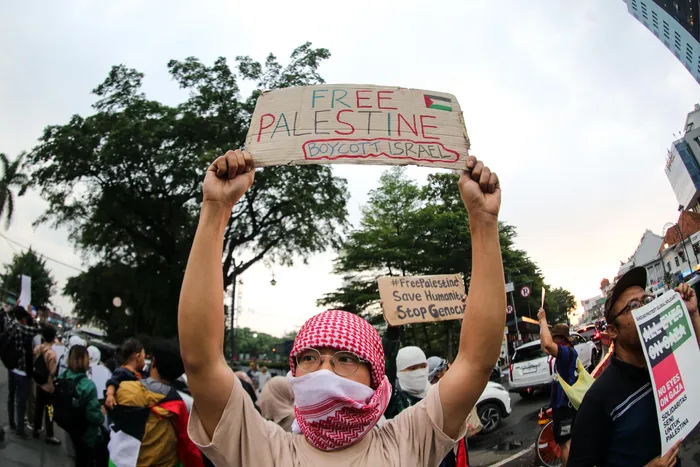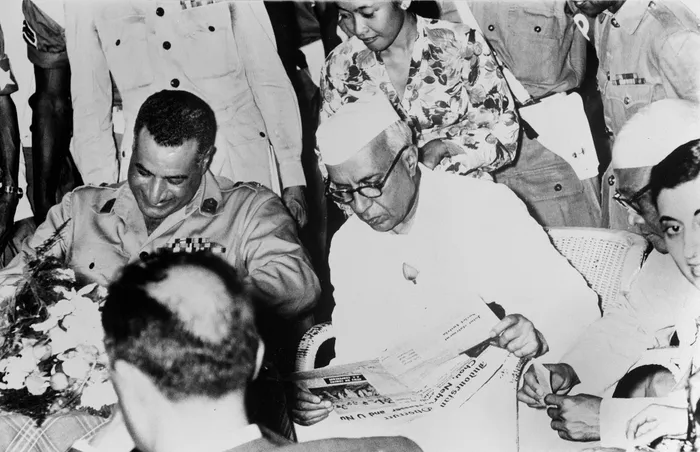A Pivotal Moment for the Global South to Recalibrate
Bandung 70th Anniversary

A protestor expressing solidarity with Palestine on Jalan Asia Afrika in Bandung City, West Java, Indonesia, on April 25, 2025. The protest against the cancellation of the commemoration meeting ahead of the 70th Asia Africa Conference.
Image: AFP
Alvin Botes
SEVENTY years ago, from 18–24 April 1955, a bold assembly took place in Bandung, Indonesia. Twenty-nine newly independent African and Asian nations united in defiance of colonial domination and Cold War bipolarity.
The ANC, represented by Moses Kotane and Molvi Cachalia, also attended. This historic gathering—the Bandung Conference—marked the first large-scale Afro-Asian summit dedicated to mutual cooperation, peaceful coexistence, and collective sovereignty.
Bandung was revolutionary. It asserted the rights of developing nations to sovereignty and self-determination.
Central to the conference were ten guiding principles, Dasasila Bandung, that remain relevant today:
- Respect for fundamental human rights and UN Charter principles.
- Respect for sovereignty and territorial integrity.
- Recognition of racial and national equality.
- Non-interference in internal affairs.
- Respect for national defence rights under UN norms.
- Rejection of collective defence serving major powers and pressures against nations.
- Refraining from aggression or threats against territorial or political independence.
- Peaceful resolution of international disputes.
- Promotion of mutual interests and cooperation.
- Commitment to justice and international obligations.
Bandung positioned nations of the Global South as architects of their destinies, breaking away from economic dependency on industrialized powers.
This act of geopolitical resistance birthed the Non-Aligned Movement (NAM), advocating dignity, equality, cooperation, and justice.
Yet, today, echoes of colonial domination remain disturbingly evident. A new form of empire persists as major Western powers enforce a “rules-based international order” tailored to their interests rather than international law and the letter and spirit of the UN Charter. Military interventions, economic warfare including unilateral sanctions, regime-change operations, and financial and economic coercion are still employed against nations asserting their independence.
Neocolonial structures prevail. Western corporations continue to exploit resources from the Global South under the guise of development, often fuelling conflict. Bretton Woods institutions continue to impose austerity, while global trade rules favour multinational capital. The technology and green transitions have also reinforced exploitative patterns, extracting critical minerals like cobalt and lithium under unjust terms and further fuelling domestic and regional conflicts.
Simultaneously, geopolitical rivalries have intensified into a new Cold War marked by US-China tensions and NATO expansion. This great power rivalry and cold war finds expression through proxy wars and conflicts from Gaza, the broader Middle East, Ukraine to Sudan and the Sahel. These conflicts highlight the paralysis of global institutions like the UN Security Council, crippled by archaic structures, systems, and policies.
Many Western powers have also exposed their double standards and duality in the implementation and execution of international law and the international court’s rulings particularly as it relates to Israel.
Today, the geo-political and economic landscape is in a consistent state of flux undergoing a tectonic shift. We navigate a world amid a poly crisis—wars, inequality, ecological collapse. There is a resurgence of narrow economic and political nationalism, racism, sexism, xenophobia, autocracy, violent extremism and right-wing populism.
Unilateralism is on the rise and multilateralism and its institutions face existential threats as currencies, tariffs, and trade become weapons in great-power rivalries. Historical geopolitical and regional alliances are shifting and no longer premised on principles and ideology.

Egypt's President Gamal Abdel Nasser and India's Prime Minister Jawaharlal Nehru at the inaugural Bandung conference held on January 1, 1955 in Indonesia.
Image: AFP
The Bandung principles offer not nostalgia but an essential blueprint for a more just, inclusive, equal, dignified and peaceful future. The spirit of Bandung, solidarity among the oppressed, South-South cooperation, and an equitable, inclusive, just, peaceful, stable and sovereign global order—remains urgently relevant. It emphasises that genuine peace, security and development cannot be imposed externally but must emerge from within.
Firstly, active non-alignment must be revived, not passive neutrality, but principled independence from imperialist pressures. Global South nations must reject bullying and coercion from major powers, anchoring foreign policies in justice, solidarity, and sovereignty. South Africa, for example, must resist choosing between Washington and Beijing, charting instead an independent policy based on our historic concentric principles of Pan-Africanism, anti-imperialism, human rights, international law, peaceful resolution of conflict, multilateralism and international solidarity.
Secondly, Bandung underscores the necessity of deeper South-South cooperation. Initiatives like BRICS, AfCFTA, the New Development Bank, and alternative global payment systems to the SWIFT, reflect this legacy but must extend beyond trade into education, science, culture, and grassroots solidarity. These systems must prioritise justice, equality, inclusivity, ecological sustainability, and decolonial values.
Thirdly, mutual respect and non-interference remain critical amid the new Cold War and great power rivalry that is finding expression through, hybrid warfare, propaganda, and proxy conflicts. Human rights must not be weaponized for regime change or unilateral sanctions. Bandung reminds us peace is inseparable from self-determination—from Palestine to Western Sahara.
Fourthly, Bandung provides a moral framework to confront global Apartheid. Vaccine nationalism, climate injustice, restrictive migration policies, and Israeli Apartheid starkly reveal ongoing global racial hierarchies. Addressing historical injustices through reparations for slavery, colonialism, land and climate damages aligns fundamentally with Bandung’s ethical core.
Reclaiming Bandung today means not merely remembering but renewing its spirit. A "Bandung 2.0" is urgent and necessary, led and driven by the NAM. However, it must also involve both state and non-state actors—youth, women, indigenous communities, artists, intellectuals, trade unions, business and civil society. Alternatives to economic extraction, patriarchy, racism, sexism and imperialism must be imagined and pursued collectively.
Bandung 2.0 must also integrate intersectional and ecological justice. The climate crisis demands a global pact rooted in solidarity, demanding debt cancellation, financing just transitions, and protecting frontline communities. Additionally, it must fight fiercely in defence of multilateralism, multipolarity, and multiculturalism, countering the reactionary forces of unilateralism and narrow economic and political nationalism.
As we commemorate Bandung’s 70th anniversary, we must not merely recall but boldly and bravely renew its spirit. Just as the delegates in 1955 courageously defied imperial intimidation, we too must confront today's challenges and bullies with determination, steadfastness and resilience.
Bandung’s anniversary is more than a commemoration; it is a clarion call for unity, dignity, and justice from the Global South in a world plagued by coercion, division, war, and ecological collapse.
* Alvin Botes is an ANC MP and Deputy Minister of International Relations & Co-operation. He is also a member of the ANC’s NEC subcommittee on International Relations.
** The views expressed do not necessarily reflect the views of IOL, Independent Media or The African.